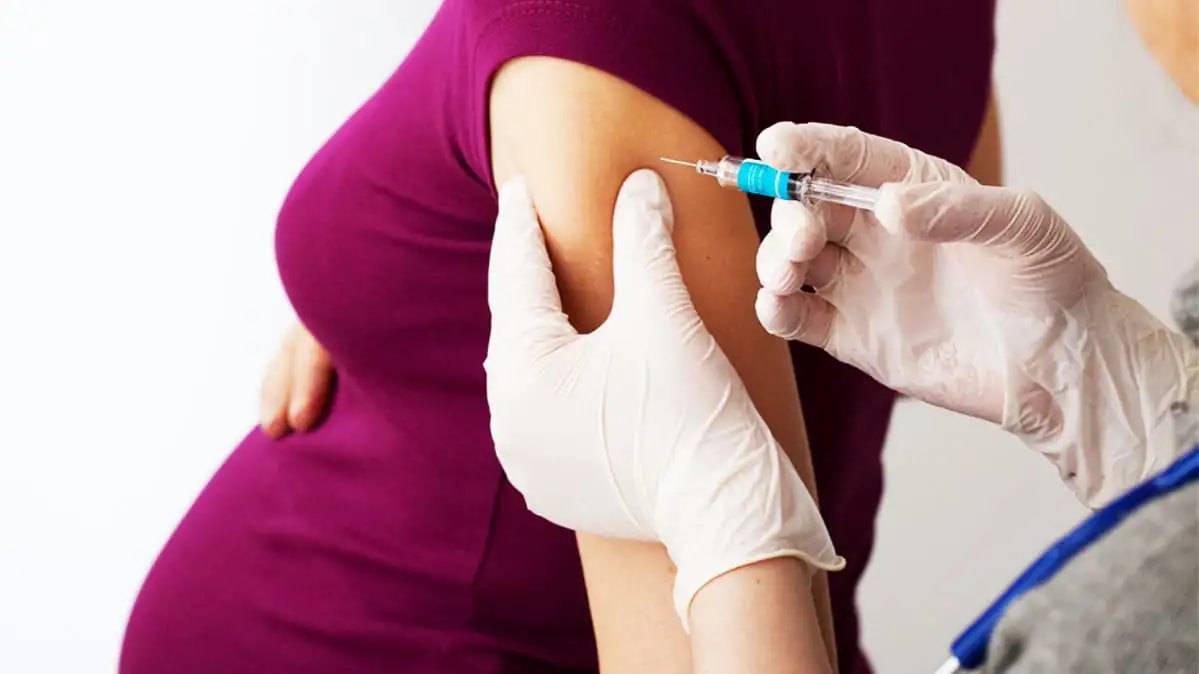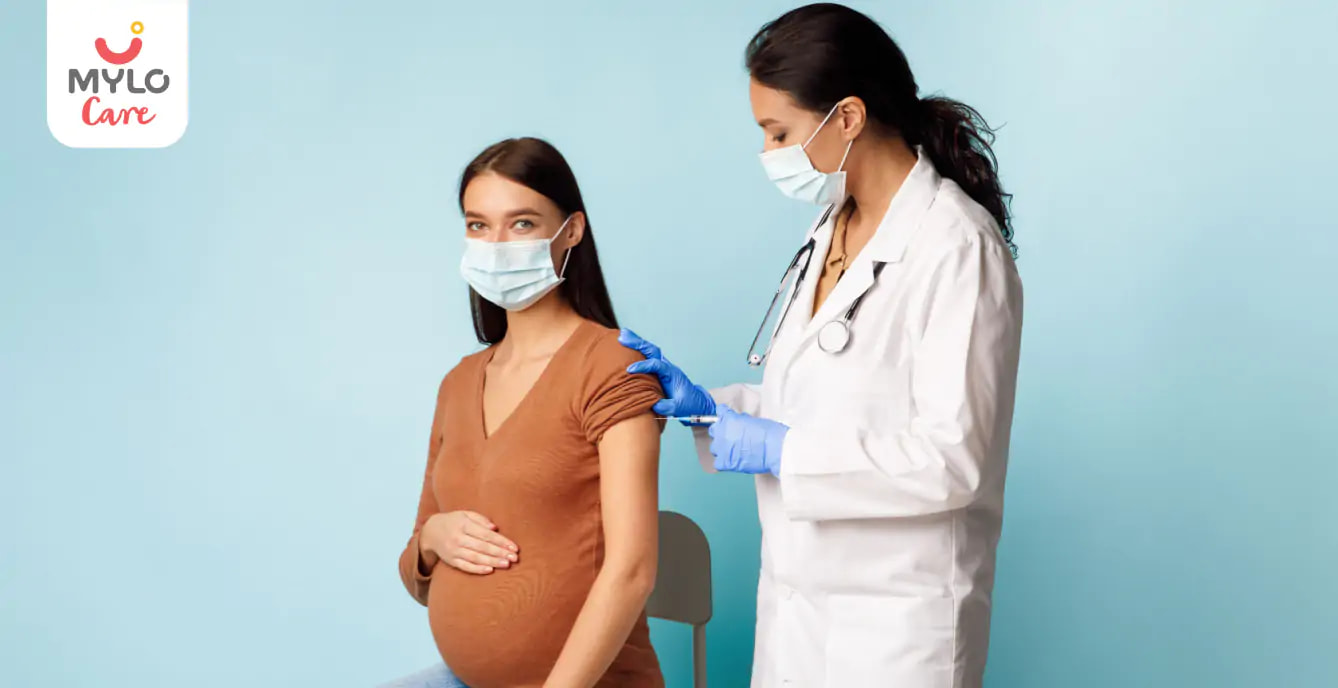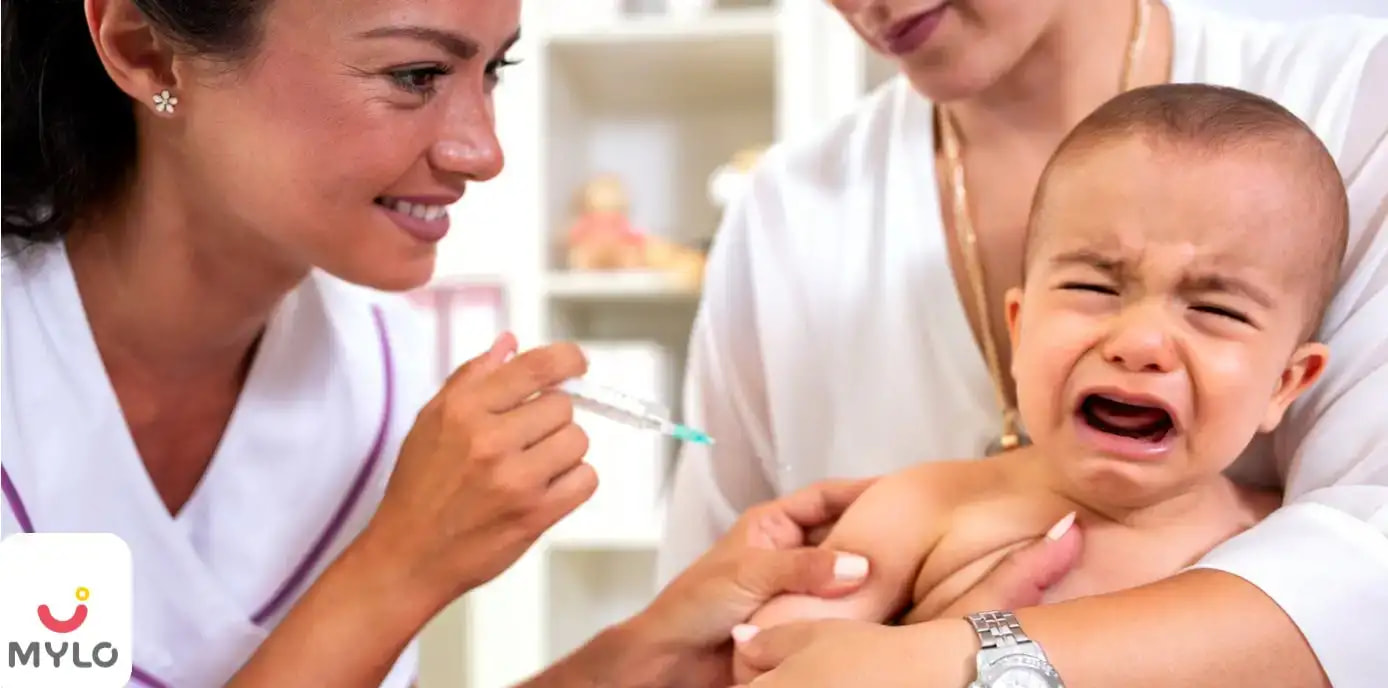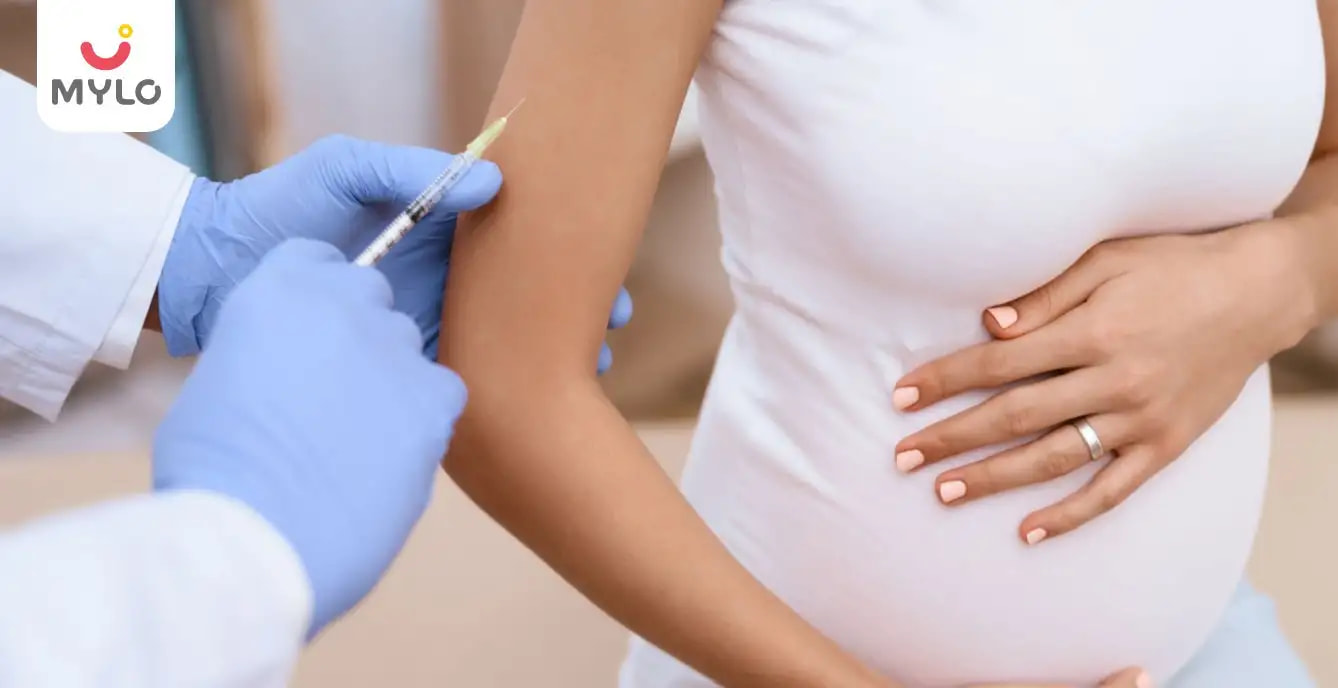Home

Vaccinations

Vaccination in Pregnancy: The Complete Schedule for Pregnant Women
In this Article

Vaccinations
Vaccination in Pregnancy: The Complete Schedule for Pregnant Women
Updated on 3 November 2023
Bringing new life into the world is a joyous and transformative journey, but it also comes with its fair share of responsibilities. As an expectant mother, ensuring the well-being and safety of your baby is undoubtedly your top priority. That's why understanding the importance of vaccination in pregnancy is crucial. By providing protection against potentially harmful infections, vaccines can significantly contribute to a healthy pregnancy and a thriving baby.
But what exactly does the pregnancy vaccine schedule look like? In this article, we will explore the recommended vaccinations for expectant mothers, their benefits, vaccines contraindicated in pregnancy and the potential risks associated with them.
What is the Importance of Vaccination During Pregnancy?
During pregnancy, a woman's immune system undergoes changes to support the growing baby. Vaccination plays a crucial role in protecting both the mother and the baby from preventable diseases. Here are five benefits of getting vaccinated during pregnancy:
1. Protecting the Mother
Vaccines such as the flu shot and Tdap (Tetanus, Diphtheria, and Pertussis) vaccine help prevent illnesses that can pose a risk to pregnant women. Influenza, for example, can lead to severe complications during pregnancy.
2. Protecting the Baby
When a pregnant woman receives certain vaccines, she passes on immunity to her developing baby. This can help protect the baby in the early months of life when they are most vulnerable to infections.
3. Reducing the Risk of Preterm Birth
Infections during pregnancy can increase the risk of preterm birth. By getting vaccinated, pregnant women can reduce the chances of developing infections such as influenza, which can potentially lead to preterm labor.
4. Preventing Birth Defects
Rubella (German measles) can cause serious birth defects if a woman contracts the virus during pregnancy. Vaccination against rubella before conception or during pregnancy can prevent these birth defects.
5. Protecting Against Pertussis
Pertussis, also known as whooping cough, can be life-threatening for infants. By receiving the Tdap vaccine during pregnancy, a mother can pass on protective antibodies to her baby, providing them with early protection against this highly contagious disease.
Pregnancy Vaccine Schedule
It is important for pregnant women to follow a recommended vaccination schedule to ensure optimal protection for themselves and their babies. Here is a list of necessary vaccines during pregnancy:
1. Influenza Vaccine
The flu shot is recommended for all pregnant women, regardless of the stage of pregnancy. It is safe and can be given at any time during pregnancy.
2. Tdap Vaccine
The Tdap vaccine, which protects against tetanus, diphtheria, and pertussis, is recommended during the third trimester of each pregnancy. This timing ensures that the baby receives the maximum benefit of antibodies.
3. Hepatitis B Vaccine
If a pregnant woman is at high risk of hepatitis B infection, she may be recommended to receive the hepatitis B vaccine during pregnancy. This vaccine is given in a series of three doses.
4. Other Vaccines
Depending on individual circumstances, a healthcare provider may recommend additional vaccines such as the MMR (measles, mumps, rubella) vaccine or the varicella vaccine if a woman is not immune to these diseases.
You may also like: Infections During Pregnancy That Can Harm Your Baby
Pregnancy Vaccination Chart
Routine vaccination |
Before pregnancy |
During pregnancy |
|
COVID-19 |
Yes |
Yes |
|
Flu shot |
Yes |
Yes, if you did not get it before pregnancy |
|
Hepatitis A |
Contraindicated |
If indicated |
|
Hepatitis B |
If indicated |
If indicated |
|
Hib(Haemophilus influenzae) |
1 or 3 doses if indicated |
If indicated |
|
HPV |
Maybe, people aged 27-45 |
No |
|
MMR |
Contraindicated |
No |
|
Meningococcal |
If indicated |
If indicated |
|
Pneumococcal |
If indicated |
If indicated |
|
Td/Tdap(tetanus, diphtheria, pertussis) |
Yes |
Each pregnancy between 27 and 36 weeks |
|
Varicella (chicken pox) |
Avoid conception for 4 weeks |
No |
|
Zoster |
No |
No |
Vaccines Contraindicated in Pregnancy
While many vaccines are safe and recommended during pregnancy, there are certain vaccines that are contraindicated. This means they should be avoided during pregnancy due to potential risks. Here are seven vaccines that are generally not given during pregnancy:
1. MMR Vaccine
The MMR vaccine, which protects against measles, mumps, and rubella, is a live vaccine and is not recommended during pregnancy. It is best to receive this vaccine before getting pregnant.
2. Varicella Vaccine
The varicella vaccine, which protects against chickenpox, is also a live vaccine and should be avoided during pregnancy. It is advisable to get vaccinated before conception if a woman is not immune to chickenpox.
3. BCG Vaccine
The BCG vaccine, which provides protection against tuberculosis, is not recommended during pregnancy. It is usually given to infants shortly after birth in countries with a high prevalence of tuberculosis.
4. Yellow Fever Vaccine
The yellow fever vaccine should be avoided during pregnancy due to limited safety data. Pregnant women traveling to areas with a risk of yellow fever should consult with their healthcare provider for advice.
5. Typhoid Vaccine
The injectable typhoid vaccine is generally not recommended during pregnancy. If travel to a high-risk area is unavoidable, a healthcare provider may consider the oral typhoid vaccine after assessing the risks.
6. Japanese Encephalitis Vaccine
The Japanese encephalitis vaccine is not recommended during pregnancy unless there is a high risk of exposure. In such cases, the benefits of vaccination should be weighed against the potential risks.
7. Rabies Vaccine
The rabies vaccine should only be given to pregnant women if there is a significant risk of exposure to the virus. The decision should be made in consultation with a healthcare provider.
You may also like: TT Injection in Pregnancy: The Ultimate Guide for Expecting Mothers
Potential Risks of Vaccination in Pregnancy
While vaccination during pregnancy is generally considered safe, it is important to be aware of potential risks. Here are some potential risks associated with vaccines in pregnancy:
1. Local Reactions
Some vaccines may cause local reactions at the injection site, such as redness or swelling. These reactions are usually mild and resolve on their own.
2. Fever
Fever can occur following vaccination, particularly with live vaccines. It is important to monitor the fever and seek medical attention if it persists or is accompanied by other concerning symptoms.
3. Allergic Reactions
Serious allergic reactions to vaccines are rare but can occur. Signs of an allergic reaction may include difficulty breathing, hives, or swelling of the face and throat. Immediate medical attention should be sought if these symptoms occur.
4. Pregnancy Complications
Although rare, there have been isolated reports of adverse pregnancy outcomes following certain vaccines. However, the overall benefits of vaccination in pregnancy outweigh the potential risks.
FAQs
1. How many vaccines are there during pregnancy?
The number of vaccines recommended during pregnancy may vary depending on individual circumstances. However, the most commonly recommended vaccines are the flu shot and the Tdap vaccine.
2. When is the first injection given in pregnancy?
The timing of the first injection during pregnancy depends on the specific vaccine. The flu shot can be given at any time during pregnancy. The Tdap vaccine is recommended during the third trimester, preferably between 27 and 36 weeks of pregnancy.
3. What is the timing of vaccine in pregnancy?
The timing of vaccines during pregnancy is crucial to provide optimal protection to both the mother and the baby. It is important to follow the recommendations of healthcare professionals and receive vaccines at the appropriate gestational age.
The Bottomline
Vaccination in pregnancy plays a vital role in protecting pregnant women and their babies from preventable diseases. It offers numerous benefits such as reducing the risk of infections, protecting against birth defects, and providing early immunity to the baby. However, it is important to follow the recommended vaccination schedule and avoid vaccines that are contraindicated during pregnancy. If you are pregnant or planning to conceive, consult with your healthcare provider to ensure you receive the necessary vaccines to safeguard your health and the health of your baby.
References
1. Swamy GK, Heine RP. (2015). Vaccinations for pregnant women. Obstet Gynecol.
2. Arora M, Lakshmi R. (2021). Vaccines - safety in pregnancy. Best Pract Res Clin Obstet Gynaecol.
Tags



Written by
Priyanka Verma
Priyanka is an experienced editor & content writer with great attention to detail. Mother to an 11-year-old, she's a ski
Read MoreGet baby's diet chart, and growth tips

Related Articles
Related Questions
Hello frnds..still no pain...doctor said head fix nhi hua hai..bt vagina me pain hai aur back pain bhi... anyone having same issues??

Kon kon c chije aisi hai jo pregnancy mei gas acidity jalan karti hain... Koi btayega plz bcz mujhe aksar khane ke baad hi samagh aata hai ki is chij se gas acidity jalan ho gyi hai. Please share your knowledge

I am 13 week pregnancy. Anyone having Storione-xt tablet. It better to have morning or night ???

Hlo to be moms....i hv a query...in my 9.5 wk i feel body joint pain like in ankle, knee, wrist, shoulder, toes....pain intensity is high...i cnt sleep....what should i do pls help....cn i cosult my doc.

Influenza and boostrix injection kisiko laga hai kya 8 month pregnancy me and q lagta hai ye plz reply me

Related Topics
RECENTLY PUBLISHED ARTICLES
our most recent articles

Diet & Nutrition
গর্ভাবস্থায় আলুবোখরা: উপকারিতা ও ঝুঁকি | Prunes During Pregnancy: Benefits & Risks in Bengali

Diet & Nutrition
গর্ভাবস্থায় হিং | ঝুঁকি, সুবিধা এবং অন্যান্য চিকিৎসা | Hing During Pregnancy | Risks, Benefits & Other Treatments in Bengali

Women Specific Issues
স্তনের উপর সাদা দাগ: লক্ষণ, কারণ এবং চিকিৎসা | White Spots on Nipple: Causes, Symptoms, and Treatments in Bengali

Diet & Nutrition
গর্ভাবস্থায় পোহা: উপকারিতা, ধরণ এবং রেসিপি | Poha During Pregnancy: Benefits, Types & Recipes in Bengali

Diet & Nutrition
গর্ভাবস্থায় মাছ: উপকারিতা এবং ঝুঁকি | Fish In Pregnancy: Benefits and Risks in Bengali

Diet & Nutrition
গর্ভাবস্থায় রেড ওয়াইন: পার্শ্ব প্রতিক্রিয়া এবং নির্দেশিকা | Red Wine During Pregnancy: Side Effects & Guidelines in Bengali
- ইনার থাই চ্যাফিং: কারণ, উপসর্গ এবং চিকিৎসা | Inner Thigh Chafing: Causes, Symptoms & Treatment in Bengali
- গর্ভাবস্থায় ব্রাউন রাইস: উপকারিতা ও সতর্কতা | Brown Rice During Pregnancy: Benefits & Precautions in Bengali
- Velamentous Cord Insertion - Precautions, Results & Safety
- Unlock the Secret to Flawless Skin: 7 Must-Have Qualities in a Face Serum
- Unlock the Secret to Radiant Skin: How Vitamin C Serum Can Transform Your Complexion
- Gender No Bar: 10 Reasons Why Everyone Needs a Body Lotion
- Unlock the Secret to Radiant Skin How to Choose the Perfect Body Lotion for Your Skin Type
- Top 10 Reasons to Apply a Body Lotion After Every Bath
- Communication in Toddlers: Milestones & Activities
- How to Improve Vocabulary for Toddlers?
- A Comprehensive Guide to Understanding Placenta Accreta
- Vulvovaginitis in Toddlers Causes, Symptoms and Treatment
- A Comprehensive Guide to Understanding Cerebral Palsy in Children
- Bitter Taste in Mouth During Pregnancy: Understanding the Causes and Remedies


AWARDS AND RECOGNITION

Mylo wins Forbes D2C Disruptor award

Mylo wins The Economic Times Promising Brands 2022
AS SEEN IN
















- Mylo Care: Effective and science-backed personal care and wellness solutions for a joyful you.
- Mylo Baby: Science-backed, gentle and effective personal care & hygiene range for your little one.
- Mylo Community: Trusted and empathetic community of 10mn+ parents and experts.
Product Categories
baby carrier | baby soap | baby wipes | stretch marks cream | baby cream | baby shampoo | baby massage oil | baby hair oil | stretch marks oil | baby body wash | baby powder | baby lotion | diaper rash cream | newborn diapers | teether | baby kajal | baby diapers | cloth diapers |








